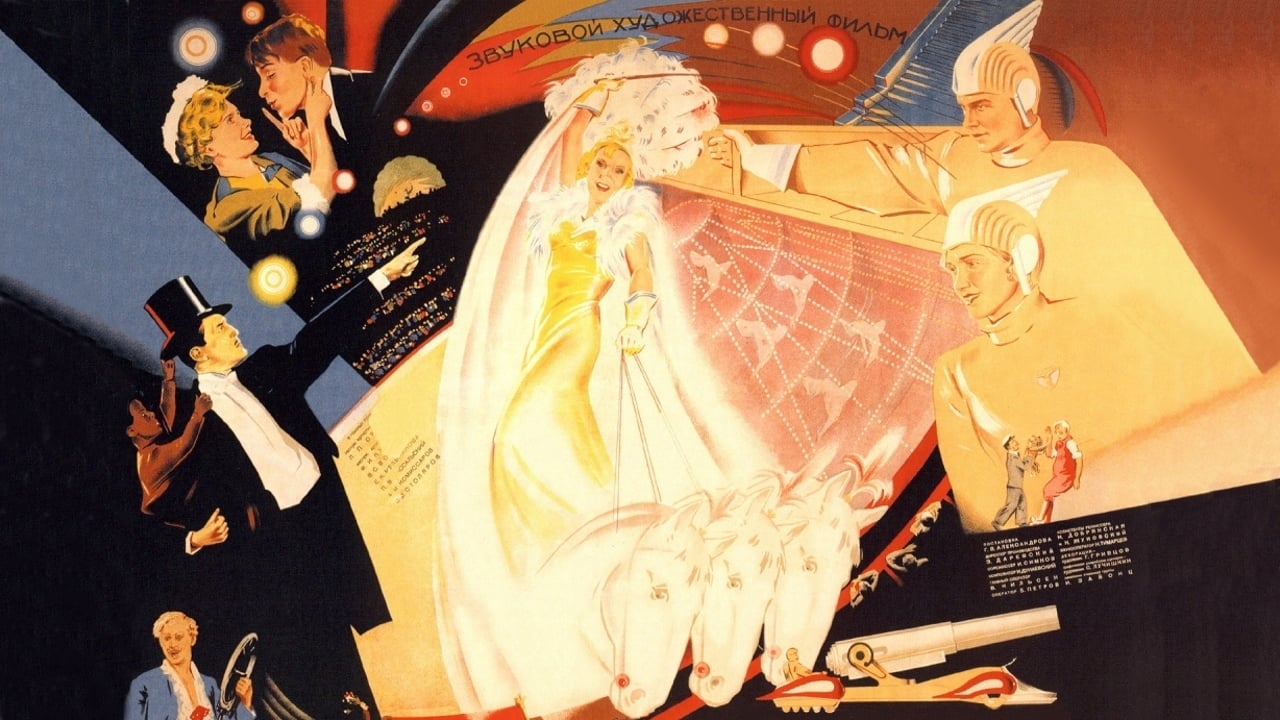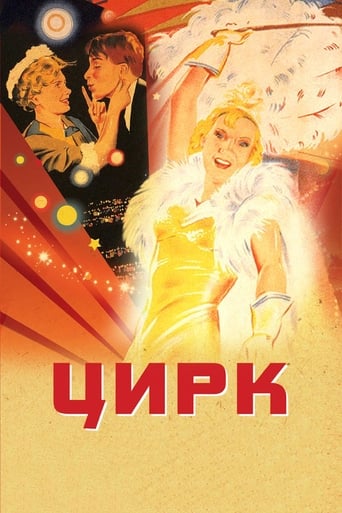

"Tsirk", to my mind, is as enjoyable as Mr Charles Chaplin's "The Circus". Unluckily our film did not miss the chance to show off some pressure of Stalin propaganda. The final demonstration and the portrait of you-know-who must have been omitted for the sake of importance and art.The scene with the trio awaiting Rayechka and entertaining the audience at the circus with their repetitive fooling around on the bicycles is one of the funniest sequences ever.The scene with Marion Dixon dancing and singing in Russian with a very peculiar accent is one of the most amazing and exhilarating black-and-white scenes I've ever seen.The scene with the two rivals (Ivan Petrovich Martynov vs. Von Kneishitz) staring each other down and out through a frosting pane is superb and feels very weird and even fearsome.The scene with a close-up of Mary before her dangerous performance is one of the most powerful.The scene with the people chanting a kind of lullaby in different languages to a black child while handing him over to one another is simply outstanding and very tender.The names. I really enjoy the use of names and numerous puns in our old films. Here the name of the main villain is "Kneischitz" (do you get the sound of it?) and one of the silly characters is called "Taburetkin" in one conversation instead of his personal "Skamejkin". As to the way Mary uses "Petrovich"... Nice verbal tricks.The funniest lines: "She was a Negro's lover! And she has a black child!!!" (Von Kneishitz) "So what? Ha-ha-ha!" (Russian audience)I could go on...Verdict: Mrs Lyubov Orlova is one of the finest actresses of the black-and-white era. Her talents are amazing (in singing, acting, dancing, intonations, stunts, good looks, powerful presence, etc.).8 out of 10 (without uneasy exaggeration at certain points and Stalinism it would zoom higher). Thank you for attention.
... View MoreA Russian musical comedy in the style of 1930's American film greats Busby Berkeley and the like, Grigori Aleksandrov's The Circus translates the socialist realist idiom of "prosperity and happiness being no longer in the future but at hand" (Dmitry Shlapentokh and Vladimir Shlapentokh, Soviet Cinematography 1918-1991 (New York: Aldine De Gruyter, 1993), 99) into a showy spectacle of song and dance. While this superficial structure exudes the optimism intrinsic to Stalinist propaganda, the underlying hostility towards capitalist (specifically German) intolerance makes its social function not only one of entertainment, but also of a call-to-arms, unifying the Soviet collective against any who would dare attack the common man, the weak, or the oppressed. The inherently multi-cultural setting of a traveling circus allows issues of state relations and symbolism to be smoothly incorporated into the thematic material of the narrative, while the characterization of German (cruel, greedy, intolerant, and remarkably Hitleresque), American (young, naïve), and Russian (strong, faceless) archetypes on the advent of World War II leaves little doubt as to the film's pointedly propagandistic nature.After barely escaping the bigotry of her fellow Americans, circus performer Marion Dixon travels to Europe where she works for a German named Von Kneishitz. He is continually greedy and cruel, assuring Marion's fidelity by repeatedly threatening to expose the scandal which drove her from her homeland: she is the mother of a "black" child. While performing in Moscow, she meets and falls in love with a Soviet soldier/performer (a poster-child of Stalinist propaganda) named Martynov. Through a series of humorous misadventures, she decides to abandon her Western past and join her lover in the joys of Soviet life. When Von Kneishitz attempts to thwart this endeavor by exposing her secret to the entire big-top, the Soviet audience (composed of representatives from each republic within the union) derides the German for his elitism, embracing both Marion and her son. The film ends with the audience (representing the Soviet collective) marching out in full form with Marion and son in tow, singing a vow to uphold Soviet ideology and to fight mercilessly anyone seeking to harm the people under Soviet charge.This impressively potent ending visually eradicates any separation between the individual characters in the film and the marching collective (a truly terrifying effect given its pre-war locale), and indicates that an optimistic or entertainment reading is an oversimplification of this film and underestimation of its director, a favorite pupil of master filmmaker Sergei Eisenstein (Deborah Young, "The Circus," review of The Circus, by Grigori Aleksandrov. Variety Movie Reviews, August 21, 2007, 27). By dissolving not only the Soviet people but also the "convert to socialism" Marion Dixon into the army of the collective, Aleksandrov is positing an ideology of inclusion (Beth Holmgren, "The Blue Angel and Blackface: Redeeming Entertainment in Aleksandrov's Circus," The Russian Review 66 (2007): 22) wherein anyone from any nation who values the ideals of tolerance, love, and faithfulness can find sanctity and protection in the arms of the Great Soviet State. Here, while the American populace is indirectly demonized in the films opening, the victimized Marion can raise her son without fear of judgment or injury. The primary contrast in ideologies, therefore, is not between Soviet socialism and American democracy, but between German nationalism (Aryan Supremacism) and the rest of mankind. If each of the three main characters (Marion, Martynov, and Von Kneishitz) is seen as a symbol of their respective ideology, the implication of the narrative is markedly different. Aleksandrov shows that in time, democracy will be won over to socialism, and the only truly incompatible enemy is therefore intolerance (or elitism). What makes the film all the more impacting is the accuracy of this prediction; America is becoming more and more socialistic, and those same enemies are the two strongest pejoratives used today: "intolerance," and "elitism".Personally I found the film to be well worth the time, although much of the humor is lost because of translation. The version I saw was also very poorly subtitled, which made it nearly impossible for viewers with no knowledge of Russian language to follow not only what was said (some sections were devoid of translation) but also who was saying it (the subtitles did not appear on screen as the words were spoken, making the speaker's identity uncertain). The musical numbers are great, and the few gags that do survive the language barrier are funny enough. However, the ending motif was so terrifying that I wouldn't recommend this film to anyone seeking a purely light-hearted film, unless of course the film were given a purely absurdist reading, mocking the notion of Soviet Russia as tolerant. Such a reading, however, requires a certain level of both, well, intolerance and elitism.
... View MoreIt's easy as an American to view this film as a piece of propaganda, but I'm sure there are films from the same time period that are just as heavy handed, in fact some of the films being released today are just as self righteous and absurd. One thing that I found interesting was how this film tackled the issue of white women having black children, this certainly was not happening in America at the time. The film has a unique sense of humor that may not hold up well today, but it does have its moments, The Russian Superman was my favorite. It is also a good movie to compare to American musicals of the time such as 42nd Street, except with a Russian twist.
... View MoreIf you are going to make a movie endorsing the actions of one of history's greatest villains, in this case Stalin, at least make it fun to watch! "Tsirk" is a funny, melodramatic, accessible movie that features several entertaining acts, such as the impromptu Lion Tamer, the dance on the cannon, and the communal ending. It is heartwarming to see an entire country represented as they sing a child to sleep, until you realize that the Yiddish Representatives were executed after the production. The running theme of confusion, over translation and ideologies, provided the movie with several humorous moments of error, and provided the movie with an honest subtext.Also, worth pointing out, is the movie's fearless attitude towards racism. Hollywood would hint at the problem, but rarely delve into it as much as "Tsirk" has.
... View More